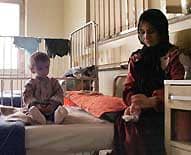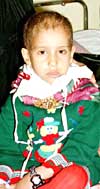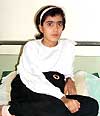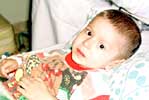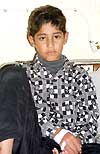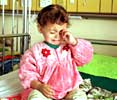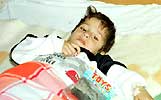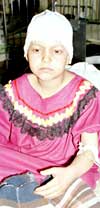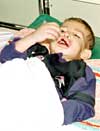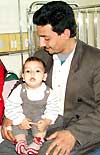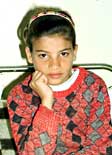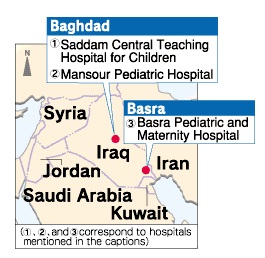Discounted Casualties:The Human Cost of Depleted Uranium, Part 5 SpecialReports Iraqi children attacked by cancer
Jun. 18, 2000
Rates 3-4 times higher since the Gulf War
Lives slipping awayDoctors wringing their hand
Economic sanctions - medicines scarce
A young girl with large, clear eyes stares fixedly at a single point. A young boy anxiously submits to a doctor's daily checkup. A cherubic infant lies in his father's arms.
When one child loses the battle, another child newly seized by disease is carried in. The cancer wards in Baghdad's Saddam Central Teaching Hospital for Children and other major hospitals in the capital and southern Iraq are overflowing with children suffering from leukemia and other diseases. The doctors diligently treat the children, anguished by their powerlessness and the inability to save these young lives.
Diagnosing two or three cases of leukemia a day at one hospital is not unusual. But the hospitals lack sufficient medical supplies, instruments, and equipment to save the children. The Iraqi occupation of Kuwait in August 1990, was met with an immediate UN Security Council resolution calling for economic sanctions on Iraq. The sanctions are still in effect.
"Children with leukemia have lowered immunity, but we can't keep them in sterile, intensive-care units or give them bone-marrow transplants. All we can give them is chemotherapy to prolong their lives a little." Doctor Salma Hadad (45) at Mansour Pediatric Hospital in Baghdad, who treats such children every day, bites her lip in frustration that the children of Iraq cannot benefit from superior treatment methods widely available elsewhere.
Children's cancer rates have spiraled 300-400% since before the Gulf War in 1991. Leukemia incidence began rising dramatically around 1994 and continues at a high level. Forty percent of the cancer victims up to 15 years old have leukemia, more than double the figure for lymphoma, the second most common pediatric cancer.
Many children living in rural areas who are struck with cancer and other serious diseases die without even a diagnosis because their parents cannot pay for the transport to or the lodging in Baghdad or Basra, where the big hospitals are located.
Iraqi doctors believe that the increase in cancer patients after the Gulf War among adults as well as children is largely due to the depleted uranium munitions used by the US and British forces during the battles.
According to a survey by the United Nations Children's Fund (UNICEF), though the death rate of Iraqi children five years and younger steadily declined during the 1980s, it more than doubled to 120 or 130 persons per thousand during the 1990s after the Gulf War. In addition to depleted uranium and other environmental factors, such high death rates must be attributed to the economic sanctions applied to Iraq primarily by the US, Great Britain, Japan, and other countries, primarily those in the Western bloc.
The reason given for continuing the economic sanctions is that the Saddam Hussein administration has not observed the ban on manufacturing weapons of mass destruction and other provisions of the ceasefire agreement. However these sanctions are affecting the government, they are also definitely robbing innocent Iraqi children of their lives. (Story and photos by Akira Tashiro)
(Originally published on June 18, 2000)

